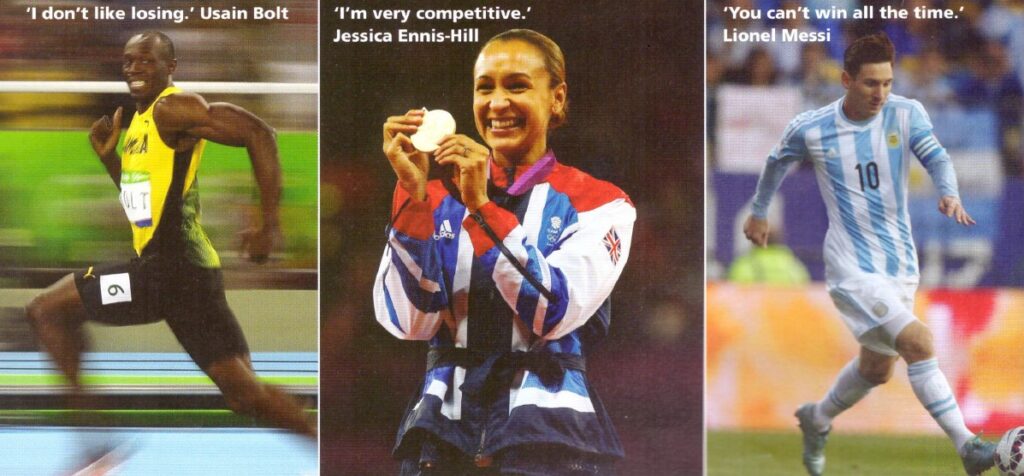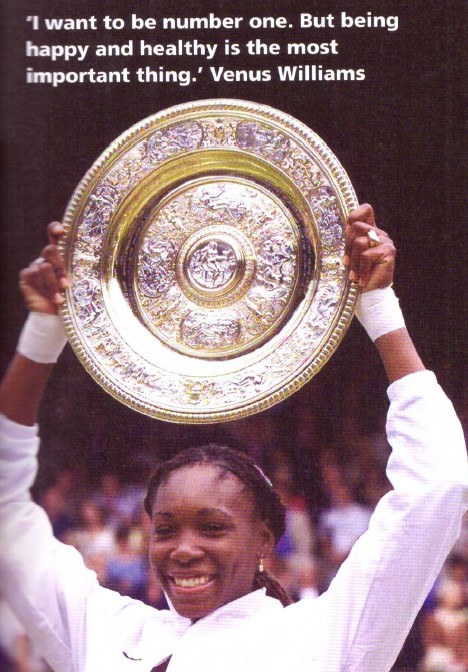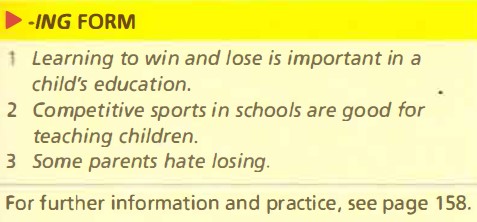Life A2 | Unit 2
1. Are any of the sports people in the photos famous in your country? Match the people with these words.
tennis player runner footballer athlete
Listening
1. Read the quotes with the photos. Do you think winning is always important in sport? Why? Why not?


2. Listen and complete
Transcript
1
Learning to win and lose is important in a child’s education because it teaches you about life. So I think competitive sports in schools are good for teaching children. They’re also good for their physical health, because when children try to win, they work harder and get more exercise. The other good thing about competitive sports is that you learn to work well in teams when you play in matches. Competitions are a great lesson in teamwork.
2
Some children aren’t good at sport, so when school sports are competitive, they always lose. That’s really bad for the child. The fact is that not all children are the same and some children don’t like doing sport. I think schools in my country should be more like the schools in Finland. They get good results but they aren’t competitive and they don’t have competitive sports either. So when a child can’t do a sport very well, that’s ok as long as they do their best and try hard at everything they do.
3
We have a sports day at my school and the children love it. Yes, winning is nice for a child, but the whole day is also a lot of fun. So overall] don’t think there’s a problem with having competitive sports in school – the problem is with some of the mothers and fathers. Some parents hate losing and they get very competitive. When there’s a race or a match some of them shout at their kids. They think it’s the Olympic Games or something!
After Listening
Look at these opinions for and against competitive sports in schools. Which are the opinions for (F) and which are the opinions against (A)?
- Winning and losing teaches students about life.
- A lot of schools with good results don’t have competitive sports.
- Children get more exercise when they try to win.
- Winning isn’t important as long as you do your best.
- Children learn to work well in teams when they play in matches.
- Students learn to work hard with competitive sports.
- Some parents don’t like losing and get angry with their children.
- All children are different and some aren’t good at sport.
- Competitive sports are fun.
Listen again. Match the opinions with the Speakers.
Grammar -ING Form
Look at the grammar box. Find the
verbs in the -ing form. Then match them
with the uses of the -ing form (a-c).

a It is the subject of the sentence.
b It comes after a verb, e.g. like, dislike.
c It comes after a preposition, e.g. of.
-ing form
We use the -ing form of a verb after be to form the present or past continuous:
- I’m getting ready to go out.
- I was watching a film.
However, we also use the -ing form in some other ways.
-ing form as the subject of a sentence
We can make a verb the subject of a sentence. When
we do this, we usually use the -ing form.
Playing sport is great for your health.
-ing form after prepositions
When a verb comes after a preposition, it is always in
the -ing form.
I’m not very good at swimming.
-ing form after some verbs
We sometimes put two verbs together in a sentence.
The form of the second verb depends on the first verb.
After the verbs like, dislike, love, hate, can’t stand, enjoy
and don’t mind, the second verb is in the -ing form.